Science, Engineering, and Technology
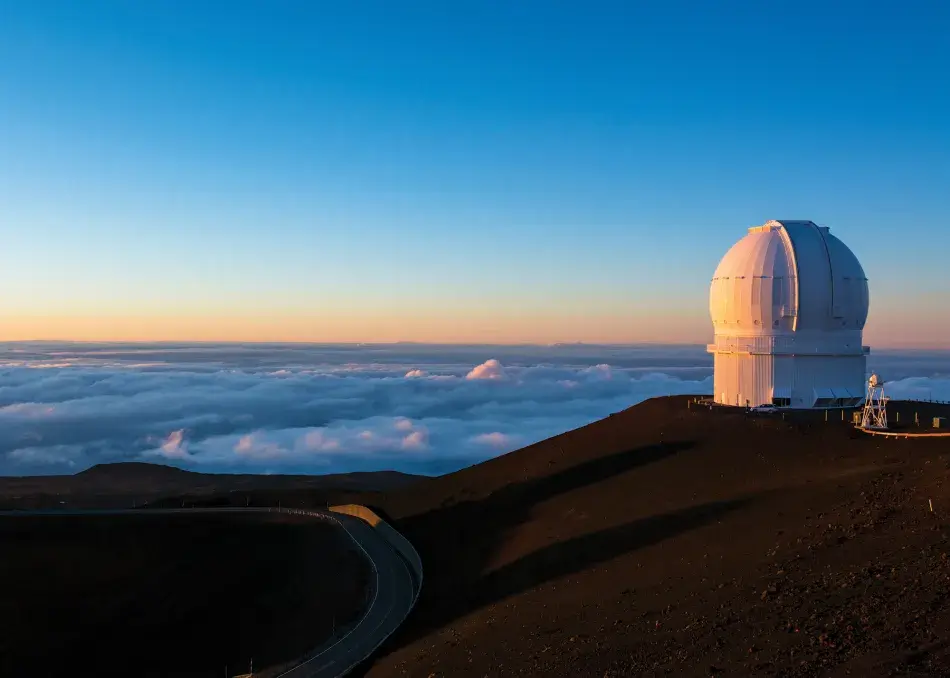
The Academy’s record of distinction in Science, Engineering, and Technology dates to its founding mission “to cultivate every art and science which may tend to advance the interest, honor, dignity, and happiness of a free, independent, and virtuous people.” Rather than generate new scientific research, the role of the Academy has been uniquely interdisciplinary, bridging the social sciences and arts with the physical sciences to support a national understanding, belief, and trust in science and discovery. Perhaps no better example of this can be found than in the mid-1800s when the Academy hosted hotly contested debates about a new scientific theory, the theory of evolution.
Academy projects in Science, Engineering, and Technology seek to strengthen the capacity of science and engineering to improve the human condition. This goal has never been more important for the nation or for the world than it is today. Global challenges increasingly require collaboration across disciplinary, professional, and national boundaries, while rapid advances in information processing and transmission raise new issues for both the management of scientific and technical information and for the ability of individuals and institutions to assimilate and act on new discoveries.
Project
Commission on Accelerating Climate Action
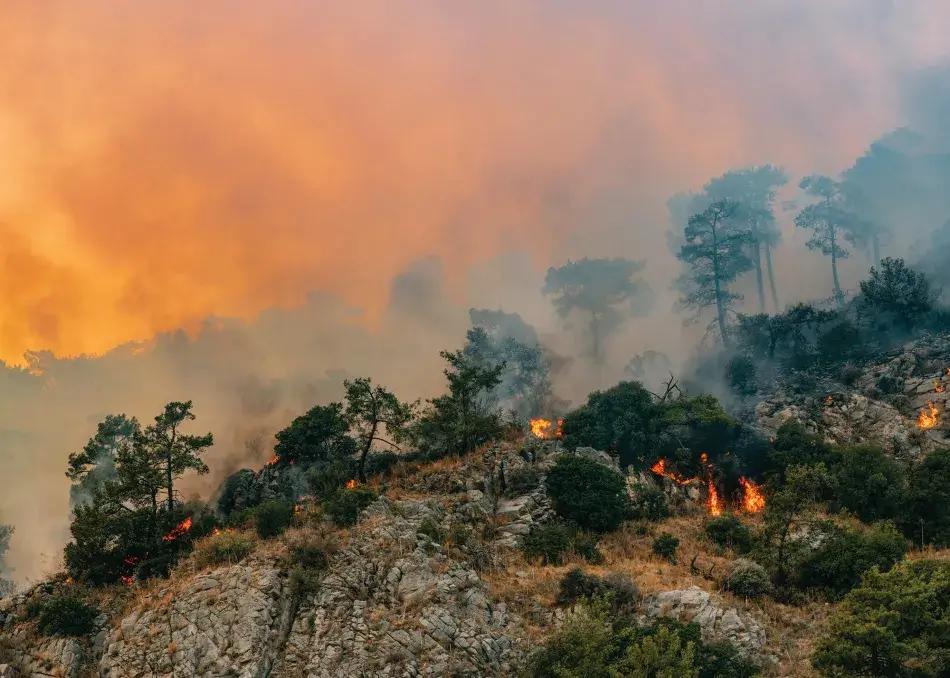
The scientific consensus is clear: climate change is upon us, and its impacts will be devastating and increasingly difficult to prevent and address if we do not take action now. Polarization and a continued partisan divide have made climate change an entrenched political issue –a space where data, conclusions, and arguments from scientists have not sufficed to compel effective action. Most Americans express support for a broad array of climate policies and for greater action from different levels of government. Yet, critically needed legislation is stalled and the United States is unlikely to meet its goal to help limit warming to 1.5 degrees Celsius. To address this challenge facing our global society, the Academy formally launched a project on climate action in September 2021.
Unlike other climate change studies, the Commission will not produce or analyze climate science data; it will not limit its recommendations to certain disciplines or economic sectors. Rather, the Commission will seek to leverage the full toolkit of its broad membership to reveal unique and creative interdisciplinary solutions: novel, specific, targeted actions that, if taken, would dramatically alter the trajectory of U.S. action on climate change.
In the past year, the Commission assessed the national landscape on climate action across stakeholder groups and sectors, including at the grass-roots level. To accomplish this, they established three workstreams: Communication, the Private Sector, and Human & Military Security. Each working group identified known major barriers to action and the stakeholders and sectors in which they exist, named gaps in our understanding of climate inaction, and identified issues in accelerating climate action.
In the coming year, the Commission will share its findings on barriers to action with the public and shift its focus toward solutions and recommendations to spur action.
COMMISSION Chairs
Mustafa Santiago Ali
National Wildlife Federation
Christopher Field
Stanford University
David G. Victor
University of California San Diego
Patricia Vincent-Collawn
PNM Resources
COMMISSION MEMBERS
Benjamin Backer
American Conservation Coalition
Xiye Bastida
Fridays for Future
Phyllis L. Bayer
Dumbarton Strategies, LLC
Mitchell Bernard
Natural Resources Defense Council, Inc.
Philip Bredesen
State of Tennessee
Patricia Cochran
Alaska Native Science Commission
Ertharin Cousin
Food Systems for the Future
Mariano-Florentino Cuéllar
Carnegie Endowment for International Peace
Leanne Kealoha Fox
Institute for Climate & Peace
Tim Guinee
Climate Actors
Rebecca Henderson
Harvard University
Mitchell C. Hescox
Evangelical Environmental Network
Charles O. Holliday, Jr.
Bank of America
Russel L. Honoré
Joint Task Force Katrina, Leadership, Safety & Global Preparedness Authority
Bob Inglis
republicEn.org
Kathleen Hall Jamieson
University of Pennsylvania
Mike Johanns
formerly, U.S. Department of Agriculture; formerly, U.S. Senate
Alexander Karsner
X (Alphabet Inc.)
Elizabeth Kolbert
The New Yorker
John Paul Mejia
Sunrise Movement
Katherine Orff
SCAPE
Gary Roughead
Hoover Institution
Linda Rudolph
Public Health Institute
Roger Sant
The AES Corporation
J. Marshall Shepherd
University of Georgia
Doreen Stabinsky
College of the Atlantic
Hilary Tompkins
Hogan Lovells
Elke Weber
Princeton University
PROJECT STAFF
Carson Bullock
Program Associate
Sophia Charan
Hellman Fellow in Science and Technology Policy
Kay Lowden
Program Associate
Tania Munz
Chief Program Officer
Islam Qasem
John E. Bryson Program Director
Jennifer Smith
Program Coordinator
Amanda Vernon
Program Officer & Hellman Fellow in Science and Technology Policy
FUNDERS
John E. Bryson and Louise Henry Bryson
Hansjörg Wyss
The Alfred P. Sloan Foundation
The Grantham Foundation for the Protection of the Environment
The David and Ellen Lee Family Foundation
The Robert F. Higgins Fund for Science, Engineering and Technology
William and Helen Pounds
Roger Sant and Doris Matsui
Commission Meetings
Virtual Second Meeting of the Commission
December 3, 2021
The meeting focused on incorporating environmental justice into the work of the Commission. The members also discussed the reports and plans of action from the three working groups, important stakeholders, and key audiences.
Hybrid Third Meeting of the Commission
June 6, 2022
The participants discussed each of the working groups’ sounding sessions and the intersections between the groups and began the process of thinking about recommendations.
Sounding Sessions
The working groups of the Commission (Communication, the Private Sector, and Human & Military Security) met three times, in total, and talked to more than forty-five people as a way to identify known major barriers to action and the stakeholders and sectors in which they exist and to identify issues in accelerating climate action.
Project
Challenges for International Scientific Partnerships

Challenges for International Scientific Partnerships (CISP) articulates the benefits of international collaboration and recommends solutions to the most pressing challenges associated with the design and operation of international partnerships. The initiative identifies policy recommendations and best practices to mitigate challenges for international science collaborations, including physical facilities, distributed networks, and peer-to-peer partnerships.
The project released its first report, America and the International Future of Science, in December 2020, its second report, Bold Ambition: International Large-Scale Science, in June 2021, and a third and final report, Global Connections: Emerging Science Partners, in February 2022.
The Large-Scale Science (LSS) working group approaches international collaborations through the lens of issues particular to large-scale science, not peer-to-peer or small-scale international work. This group has been tasked with exploring how the United States can enhance its role in these partnerships, both in physical facilities (such as CERN) and distributed networks (such as the Human Cell Atlas). This group is focusing on recommendations that will bolster the United States’ ability to partake in large-scale collaboration efforts as meaningful and engaged partners.
The Emerging Science Partners (ESP) working group explores issues particular to U.S. scientific collaborations at all scales with countries seeking to boost their scientific capacity, particularly those with limited resources to do so. This working group frames discussions around how the United States can be a better collaborator in its partnerships with emerging science partner countries and work to increase equity in these collaborations.
Project Chairs
Arthur Bienenstock
Stanford University
Peter Michelson
Stanford University
STEERING COMMITTEE MEMBERS
Claude R. Canizares
Massachusetts Institute of Technology
Matthias W. Hentze
European Molecular Biology Laboratory
John G. Hildebrand
University of Arizona
Kerri-Ann Jones
Pew Charitable Trusts
William F. Lee
Wilmer Cutler Pickering Hale and Dorr, LLP
Shirley Malcom
American Association for the Advancement of Science
Cherry A. Murray
University of Arizona
Venkatesh Narayanamurti
Harvard University
Olufunmilayo I. Olopade
University of Chicago
Geraldine L. Richmond
U.S. Department of Energy
Vaughan C. Turekian
National Academies of Sciences, Engineering, and Medicine
Caroline S. Wagner
The Ohio State University
LARGE-SCALE SCIENCE WORKING GROUP
Arthur Bienenstock, Cochair
Stanford University
Peter Michelson, Cochair
Stanford University
Claude Canizares
Massachusetts Institute of Technology
E. William Colglazier
American Association for Advancement of Science
Inez Fung
University of California, Berkeley
Michael Holland
University of Pittsburgh
Kaye Husbands Fealing
Georgia Institute of Technology
Cherry A. Murray
University of Arizona
Philip Rubin
Yale University
Gary Sanders
California Institute of Technology
Diane Souvaine
Tufts University
EMERGING SCIENCE PARTNERS WORKING GROUP
Shirley Malcom, Cochair
American Association for the Advancement of Science
Olufunmilayo Olopade, Cochair
University of Chicago
Alice Abreu
Federal University of Rio de Janeiro
Bruce Alberts
University of California, San Francisco
Bernard Amadei
University of Colorado at Boulder
Arthur Bienenstock, ex officio
Stanford University
Jared Cohon
Carnegie Mellon University
Rita Colwell
University of Maryland
James W. Curran
Emory University
Ali Douraghy
Lawrence Berkeley National Laboratory
(concluded participation in the working group on January 19, 2021)
Nina Dudnik
Seeding Labs
Mohamed Hassan
The Sudanese National Academy of Sciences
John G. Hildebrand
University of Arizona
Nkem Khumbah
University of Michigan
Peter Michelson, ex officio
Stanford University
Peggy Oti-Boateng
United Nations Educational, Scientific, and Cultural Organization
Jamil Salmi
Diego Portales University
Flavia Schlegel
United Nations Educational, Scientific, and Cultural Organization
Vaughan C. Turekian
National Academies of Sciences, Engineering, and Medicine
Caroline Wagner
The Ohio State University
PROJECT STAFF
Carson Bullock
Program Associate
Sophia Charan
Hellman Fellow in Science and Technology Policy
Kay Lowden
Program Associate
Tania Munz
Chief Program Officer
Islam Qasem
John E. Bryson Program Director
Peter Robinson
Morton L. Mandel Director of Strategic Implementation
Jennifer Smith
Program Coordinator
Rebecca Tiernan
Program Associate
Amanda Vernon
Program Officer & Hellman Fellow in Science and Technology Policy
FUNDERS
The Alfred P. Sloan Foundation
William and Flora Hewlett Foundation
Gordon and Betty Moore Foundation
Project Publications
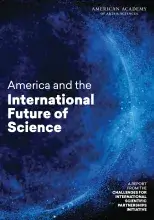
America and the International Future of Science (American Academy of Arts and Sciences, 2020)
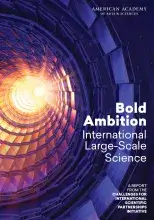
Bold Ambition: International Large-Scale Science (American Academy of Arts and Sciences, 2021)
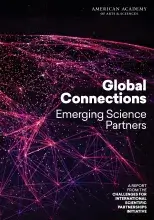
Global Connections: Emerging Science Partners (American Academy of Arts and Sciences, 2022)
Project Meetings and Outreach Events
July 9, 2021
Consultation with U.S. Department of Energy on the Bold Ambition report.
August 18, 2021
Briefing on the Bold Ambition report with the Office of Science and Technology Policy.
November 15, 2021
Outreach event for the project at a meeting hosted by the Asia Society.
December 6, 2021
Emerging Science Partners Impact Workshop.
January 19, 2022
Briefing on the Global Connections report with the National Science Foundation.
January 27, 2022
Briefing with the National Science and Technology Council.
January 28, 2022
Launch event for the Global Connections report.
March 9, 2022
Briefing about the Global Connections report with staff from the U.S. House Committee on Science.
April 18, 2022
Briefing about the Global Connections report with staff at the U.S. Department of Energy.
April 22, 2022
Second briefing on the Global Connections report with the National Science Foundation.
May 13, 2022
Briefing on the Global Connections report with the American Association of Universities.
Project
Resiliency in Supply Chains
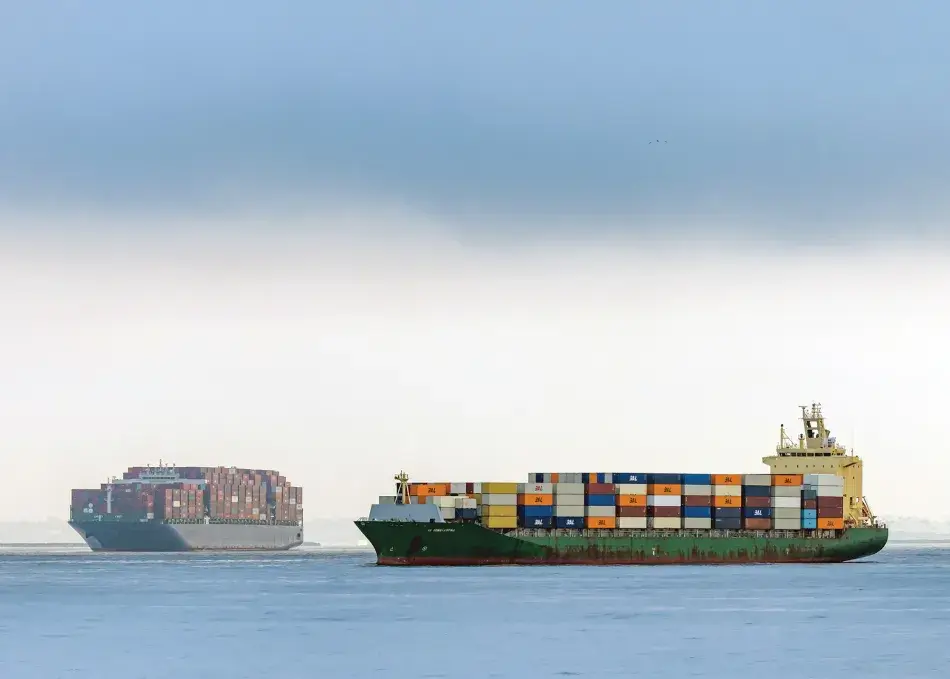
On October 29, 2021, the Academy held a hybrid exploratory meeting, led by Margaret Levi (Stanford University) and Richard Locke (Brown University), on building resilient and ethical supply chains for a post-COVID world. The meeting, which followed from three virtual soundings held during the spring and summer of 2020 that engaged Academy members, brought together experts from academia, business, philanthropy, and government. The participants considered the supply chain vulnerabilities that were surfaced, exacerbated, and/or created by the global pandemic and discussed possible solutions to build more ethical and resilient supply chain systems. They explored three domains in particular: healthcare and food security; ethics, labor, and workers’ protections; and security and resiliency of global supply chains.
MEETING CHAIRS
Margaret Levi
Stanford University
Richard Locke
Brown University
MEETING PARTICIPANTS
Lisa Anderson
Columbia University
Benjamin Armstrong
Massachusetts Institute of Technology
John Brown
University of Southern California
R. Alta Charo
University of Wisconsin Law School
Joshua Cohen
Apple, Inc.
Henry Corrigan-Gibbs
Massachusetts Institute of Technology
Ezekiel J. Emanuel
University of Pennsylvania
Mary E. Gallagher
University of Michigan
Sarita Gupta
Ford Foundation
Margaret Hamburg
National Academy of Medicine
Ashish K. Jha
Brown University
Craig Kennedy
Merck & Co., Inc.
Rosamond Naylor
Stanford University
Allison Neale
Henry Schein, Inc.
David W. Oxtoby
American Academy of Arts and Sciences
Manuel Pastor
University of Southern California
Megan Ranney
Brown University
Audrey Sacks
World Bank
Edward Steinfeld
Brown University
Heather Tansey
Cargill
Sharon Waxman
Fair Labor Association
Kathryn Wengel
Johnson & Johnson
PROJECT STAFF
Sophia Charan
Hellman Fellow in Science and Technology Policy
Kay Lowden
Program Associate
Tania Munz
Chief Program Officer
Islam Qasem
John E. Bryson Program Director
Jennifer Smith
Program Coordinator
FUNDERS
American Academy Exploratory Fund
Brown University
Ford Foundation through Brown University